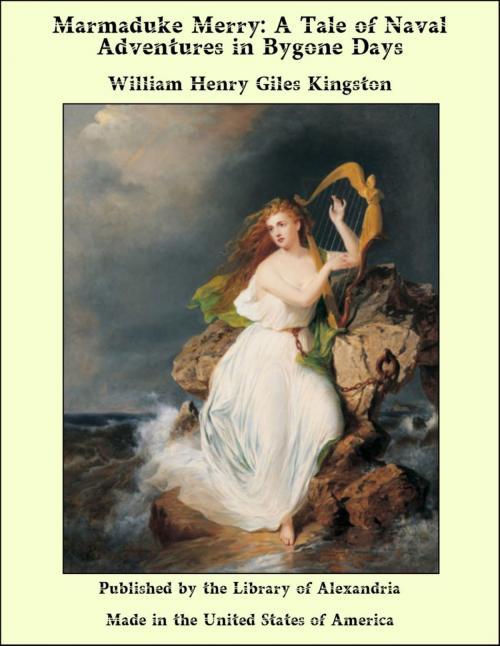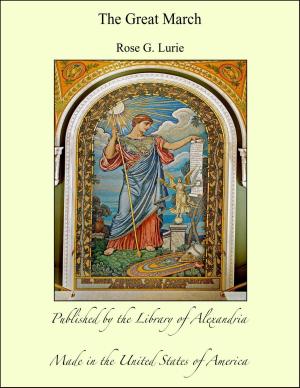Marmaduke Merry: A Tale of Naval Adventures in Bygone Days
Nonfiction, Religion & Spirituality, New Age, History, Fiction & Literature| Author: | William Henry Giles Kingston | ISBN: | 9781465597151 |
| Publisher: | Library of Alexandria | Publication: | March 8, 2015 |
| Imprint: | Language: | English |
| Author: | William Henry Giles Kingston |
| ISBN: | 9781465597151 |
| Publisher: | Library of Alexandria |
| Publication: | March 8, 2015 |
| Imprint: | |
| Language: | English |
I belong to the family of the Merrys of Leicestershire. Our chief characteristic was well suited to our patronymic. “Merry by name and merry by nature,” was a common saying among us. Indeed, a more good-natured, laughing, happy set of people it would be difficult to find. Right jovial was the rattle of tongues and the cachinnation which went forward whenever we were assembled together either at breakfast or dinner or supper; our father and mother setting us the example, so that we began the day with a hearty laugh, and finished it with a heartier. “Laugh and grow fat” is an apothegm which all people cannot follow, but our mother did in the most satisfactory manner. Her skin was fair and most thoroughly comfortably filled out; her hair was light, and her contented spirit beamed out from a pair of large laughing blue eyes, so that it was a pleasure to look at her as she sat at the head of the table, serving out the viands to her hungry progeny. Our sisters were very like her, and came fairly under the denomination of jolly girls; and thoroughly jolly they were;—none of them ever had a headache or a toothache, or any other ache that I know of. Our father was a good specimen of a thorough English country gentleman; he was thorough in everything, honest-faced, stout, and hearty, not over-refined, perhaps, but yet gentle in all his thoughts and acts; a hater of a lie and every thing dishonourable, hospitable and generous to the utmost of his means; a protector of the poor and helpless, and a friend to all his neighbours. Yes, and I may say more, both he and my mother were humble, sincere Christians, and made the law of the Bible their rule of life. He told a good story and laughed at it himself, and delighted to see our mother and us laugh at it also. Had he been bred a lawyer, and lived in London, he would have been looked upon as a first-rate wit; but I am certain that he was much happier with the lot awarded to him. He had a good estate; his tenants paid their rents regularly; and he had few or no cares to disturb his digestion or to keep him awake at night; and I am very certain that he would far rather have had us to hear his jokes, and laugh at them with him, than all the wits London ever produced. He delighted in joining in all our sports, either of the field or flood, and we always looked forward to certain amusement when he was able to accompany us. He was our companion and friend; we had no secrets from him,—why should we? He was always our best adviser, and if we got into scrapes, which one or the other of us was not unfrequently doing, we were very certain that no one could extricate us as well as he could. I don’t mean to say that he forgot the proverb, “Spare the rod, spoil the child;” or that we were such pieces of perfection that we did not deserve punishment; but we had sense enough to see that he punished us for our good: he did it calmly, never angrily, and without any unnecessarily severe remark, and we certainly did not love him the less for the sharpest flogging he ever gave us. Directly afterwards, he would meet the culprit in his usual frank, hearty way, and seem to forget all about the matter.
I belong to the family of the Merrys of Leicestershire. Our chief characteristic was well suited to our patronymic. “Merry by name and merry by nature,” was a common saying among us. Indeed, a more good-natured, laughing, happy set of people it would be difficult to find. Right jovial was the rattle of tongues and the cachinnation which went forward whenever we were assembled together either at breakfast or dinner or supper; our father and mother setting us the example, so that we began the day with a hearty laugh, and finished it with a heartier. “Laugh and grow fat” is an apothegm which all people cannot follow, but our mother did in the most satisfactory manner. Her skin was fair and most thoroughly comfortably filled out; her hair was light, and her contented spirit beamed out from a pair of large laughing blue eyes, so that it was a pleasure to look at her as she sat at the head of the table, serving out the viands to her hungry progeny. Our sisters were very like her, and came fairly under the denomination of jolly girls; and thoroughly jolly they were;—none of them ever had a headache or a toothache, or any other ache that I know of. Our father was a good specimen of a thorough English country gentleman; he was thorough in everything, honest-faced, stout, and hearty, not over-refined, perhaps, but yet gentle in all his thoughts and acts; a hater of a lie and every thing dishonourable, hospitable and generous to the utmost of his means; a protector of the poor and helpless, and a friend to all his neighbours. Yes, and I may say more, both he and my mother were humble, sincere Christians, and made the law of the Bible their rule of life. He told a good story and laughed at it himself, and delighted to see our mother and us laugh at it also. Had he been bred a lawyer, and lived in London, he would have been looked upon as a first-rate wit; but I am certain that he was much happier with the lot awarded to him. He had a good estate; his tenants paid their rents regularly; and he had few or no cares to disturb his digestion or to keep him awake at night; and I am very certain that he would far rather have had us to hear his jokes, and laugh at them with him, than all the wits London ever produced. He delighted in joining in all our sports, either of the field or flood, and we always looked forward to certain amusement when he was able to accompany us. He was our companion and friend; we had no secrets from him,—why should we? He was always our best adviser, and if we got into scrapes, which one or the other of us was not unfrequently doing, we were very certain that no one could extricate us as well as he could. I don’t mean to say that he forgot the proverb, “Spare the rod, spoil the child;” or that we were such pieces of perfection that we did not deserve punishment; but we had sense enough to see that he punished us for our good: he did it calmly, never angrily, and without any unnecessarily severe remark, and we certainly did not love him the less for the sharpest flogging he ever gave us. Directly afterwards, he would meet the culprit in his usual frank, hearty way, and seem to forget all about the matter.















